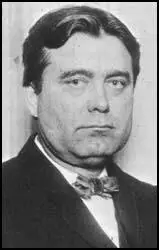William Borah

William Borah, the son of a farmer, was born in Wayne County, Illinois, on 29th June, 1865. He was educated at the Southern Illinois Academy and the University of Kansas, where he studied law.
Borah was admitted to the bar in 1890 and the following year settled in Boise, Idaho. A member of the Republican Party, Borah was elected to the Senate in 1907. During the First World War Borah was opposed to the Espionage Act and campaigned for the release of Eugene V. Debs and others imprisoned by this legislation. Borah also supported a national income tax and the direct election of senators.
A popular politician, Borah was re-elected in 1913, 1918, 1924, 1930 and 1936. He was chairman of the Committee on Education and Labor. Borah also served on the Committee on Expenditures in the Department of Justice, Committee on Interoceanic Canals and Committee on Foreign Relations.
Borah initially supported the New Deal but grew increasingly critical of the presidency of Franklin D. Roosevelt. Boram worked closely with Gerald Nye, Henrik Shipstead, Bronson Cutting, John Elmer Thomas, Burton K. Wheeler, Lynn Frazier, Robert LaFollette Jr., and other progressives in the Senate and supported Huey Long and his Share Our Wealth Plan.
In 1936 Borah was unsuccessful in his attempt to be the Republican presidential candidate. William Borah died in Washington on 19th January, 1940.
Primary Sources
(1) William Borah, speech (1923)
Let us bear in mind, my friends, that these men are not in prison at the present time by reason of any acts of violence to either person or property. Whatever might have inhered in the case with reference to these matters in the beginning has long since passed out of the case, and these men are in prison today, separated from their families, deprived of an opportunity of earning a livelihood, their health being undermined for the sole and only reason that they expressed their opinions concerning the war and the activities of the government in the prosecution of the war. They are distinctly and unquestionably political prisoners in the true sense of that term. They are not there for the violation of ordinary criminal statutes or for deeds of violence of any kind.
They are, in other words, in prison some four years after the war for expressing an opinion in regard to it. I was thinking today as I was reflecting over this situation that six months before the time we declared war some of the most prominent members of the government at that time would have been guilty of the same offense for which these men are now in prison. Six months before we entered the war it was considered most objectionable in the United States to advocate going into the war. Six months before the war began we were told that this great World War had its roots in causes
which we did not understand and with which we were not concerned and that we should keep out of it. It would seem that
the gravest offense upon the part of these men, so far as expressing their views was concerned, is that they were late in catching up with the procession. They did not or were unable to adjust their views to the changed condition of affairs as readily as others.
Do not misunderstand me. I am one of those who believe that when my country is at war, engaged in deadly strife with an enemy, as a matter of policy, we ought to surrender our individual views and get behind the government if we can possibly do so. In such times we ought to reconcile ourselves to our government's successful conduct of the war. But while that is my belief, it is also my contention, grounded in the deepest principles of free government, that if a man thinks a war is unjust or improvident, or that it is being carried on in a corrupt manner, it is his absolute right to say so. Indeed, if it is a question of the method of carrying on the war and he believes it is unwise or unjust, it is his duty to say so.
(2) Alice Roosevelt Longworth, interviewed by Michael Teague in 1981.
There were a number of really able members of the Senate in the twenties, Jim Reed, Oscar Underwood, John Sharp Williams, and Bill Borah among them. Jim Reed was a fantastic orator with a saturnine voice. We were driving around near Wilson's house the night after he died and there were a lot of people there weeping and on their knees. "Like fleas who have lost their dog," he said with his distinctive snarl.
Borah was a great friend. Like Reed, he was a great speaker. He had never been abroad. He had nearly drowned as a child apparently and he was afraid of crossing water. He came from a remote area of Illinois known as Little Egypt because of its flat delta land. He had a great leonine head and was a fascinating conversationalist. He could hold one spellbound for hours with tales of labor disputes in Illinois at the turn of the century. Unusual subjects like that. But there was a withdrawn, rather secretive quality about him, which seemed to hold him back. He was a most intriguing person.
Both John Lewis, who was another close friend, and Borah were remarkably similar in looks and also, to some extent, in temperament. They had the same large, shaggy heads and they both alternated between being very stimulating or very taciturn. They were never boring. Humor was the great bond between us.

